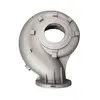Mobile:+86-311-808-126-83
Email:info@ydcastings.com
electric impeller
The Electric Impeller Revolutionizing Fluid Dynamics
In the realm of engineering and fluid dynamics, the electric impeller has emerged as a groundbreaking innovation that enhances efficiency and performance across various applications. Unlike traditional impellers that rely on mechanical drive systems, electric impellers utilize electric motors to generate rotational force, thereby transforming the way fluids are moved and managed in numerous industries.
The primary function of an electric impeller is to create a flow of liquid or gas by utilizing the principles of centrifugal force. This device typically consists of a rotor, which spins at high speeds to force the fluid outward through a designated path. The motor’s efficiency reduces energy consumption, making electric impellers a more sustainable choice compared to their mechanical counterparts. This significant reduction in energy usage aligns with global efforts to promote energy efficiency and minimize environmental impact.
One of the standout features of electric impellers is their versatility. They are widely utilized in various sectors, such as HVAC (Heating, Ventilation, and Air Conditioning), water treatment plants, marine vessels, and even in electric vehicles. In HVAC systems, for instance, electric impellers are essential for circulating air and maintaining desired temperature levels, resulting in enhanced comfort and reduced energy costs. In water treatment applications, electric impellers contribute to effective mixing and aeration processes, leading to improved water quality.
electric impeller

Moreover, the advent of smart technology has further propelled the electric impeller into the spotlight. With the integration of sensors and IoT (Internet of Things) technologies, these devices can now automatically adjust their speed and operation based on real-time demands. This intelligence not only optimizes performance but also reduces wear and tear on components, thereby extending the lifespan of the system and minimizing maintenance costs.
However, the shift toward electric impellers does not come without challenges. Engineers and designers must address issues such as heat generation, material compatibility, and the overall design complexity to ensure reliability and effectiveness. Nonetheless, ongoing advancements in materials science and electronics continue to facilitate improvements in electric impeller design, enabling them to operate efficiently under a variety of conditions.
In conclusion, electric impellers represent a significant advancement in fluid dynamics technology. Their ability to enhance efficiency, promote sustainability, and adapt to modern demands positions them as a vital component in the future of various industries. As research and development in this field progresses, we can expect electric impellers to play an increasingly critical role in shaping energy-efficient systems and solutions.
-
Why Should You Invest in Superior Pump Castings for Your Equipment?NewsJun.09,2025
-
Unlock Performance Potential with Stainless Impellers and Aluminum End CapsNewsJun.09,2025
-
Revolutionize Your Machinery with Superior Cast Iron and Aluminum ComponentsNewsJun.09,2025
-
Revolutionize Fluid Dynamics with Premium Pump ComponentsNewsJun.09,2025
-
Optimizing Industrial Systems with Essential Valve ComponentsNewsJun.09,2025
-
Elevate Grid Efficiency with High-Precision Power CastingsNewsJun.09,2025











